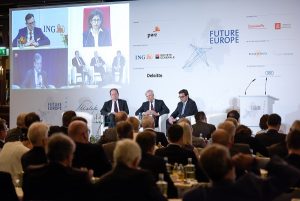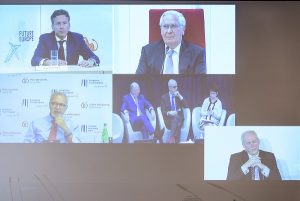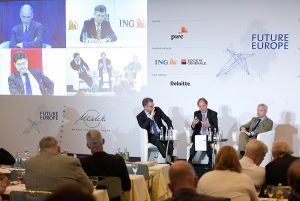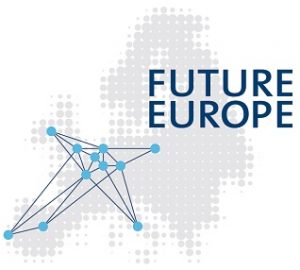Press release on the FUTURE EUROPE Conference – 700 Guests in 5 Cities attend Future Europe – Experts from politics, finance and social science discussed Europe’s future by videoconferencing
Frankfurt am Main, 20 June 2018 – Europe is at a crossroads and faces critical milestones, that if successfully addressed will enable it to retain and improve its economic performance, political freedom of action, and global competitiveness. It is urgently necessary for the EU to reinvent itself in order to continue to perform its function going forward – maintaining prosperity and peace in Europe. This was the conclusion of the “FUTURE EUROPE” conference held today, Wednesday, in Frankfurt am Main and simultaneously in the European financial centres of London, Paris, Amsterdam and Luxembourg. All told, 700 guests from the financial industry, politics, science, industry associations and media attended the conference.
Dr Andreas Dombret, Chairman of FUTURE EUROPE and a former Member of the Board of the German Bundesbank, said in his opening remarks, “This conference comes at the right moment. President Macron and Chancellor Merkel are discussing a new perspective for Europe, Brexit is coming ever closer, and it may be necessary to redefine the transatlantic relationship. In addition, tomorrow there is a meeting of the Europe Group and next week there is a European summit. Today’s conference made an important contribution to the European discussion, and it should be continued in future.” Concerning Brexit, a subject that was present throughout the day, Dombret noted, “Brexit is in no way a reason to automatically stop working with Great Britain on the Capital Market Union – ultimately it’s about practical solutions, which can also be found for the financial markets.”
Conference in 5 financial locations at the same time – direct dialogue between experts
 |
 |
 |
FUTURE EUROPE is an innovative conference format that networks leading experts and so makes possible a new form of dialogue about issues central to Europe’s future. The exchange of ideas first takes place in local panels and is then continued between cities using the latest video technology. The conference was initiated by the strategic communications consultancy MALEKI CORPORATE GROUP.
“Future Europe is a new initiative, a think tank in the form of a network, with the purpose and vision of helping the European project regain its role as a guarantor of economic and political stability,” said Dr Nader Maleki, founder of FUTURE EUROPE and founder and CEO of MALEKI CORPORATE GROUP.
The conferences were organized in close cooperation with PwC, the Banque de France and Société Générale in Paris, and the ING Group in Amsterdam. The London School of Economics and Political Science supports the project in London, while the German Council on Foreign Relations (DGAP) does so in Berlin. The MALEKI CORPORATE GROUP handled overall organization as well as the Frankfurt part of the conference.
At the conference there was heated discussion of the effects of current issues like the trade war, immigration, Brexit and the bank crisis.
Peter Praet, Board Member of the European Central Bank, said, “The EU still presents itself as an entity with many different national bank systems, which makes unified policies very complicated. A complete bank and capital market union is therefore important. But that requires some very important, fundamental decisions to be made, for example whether to veer more towards risk reduction or more towards risk sharing.”
Brexit as a challenge for the European capital market
A focus of the first panel, “Financing the EU Economy,” was the question of which aspects the EU27 should prioritize after Brexit in order to become an independent financial centre of high attractiveness. The decisions made in this regard will be decisive for the position and influence of the EU in global finance, and thus for its ability to finance European economic growth.
“As the EU we cannot allow ourselves to become dependent on an offshore financial market. The largest domestic market in the west, with over 450 people, needs its own financial and capital market to strengthen its economy and its currency,” said Harald Kayser, CEO of PwC Europe SE as of 1 July 2018.
Roland Boekhout, Member of the Management Board, ING Group (Amsterdam), said, “We need a cross-border bank consolidation so that Europe and its banks can be globally and sustainably competitive. We have to stop thinking in terms of local markets, and instead make Europe our market, including in the financial industry. To overcome the current obstacles on the way to pan-European banking we have to complete the banking union and implement the final mainstay, European deposit insurance. But that should not determine the speed with which we create a European banking market, nor should it prevent consolidation.”
Lorenzo Bini Smaghi, Chairman of the Board of Directors, Société Générale (Paris), noted, “Economic and political crises do happen, but it is important that they not endanger the integrity of the Eurozone, as that would have a devastating effect on the entire world economy. It is therefore important to strengthen the architecture of the currency union, make it more robust and more able to deal with shocks.”
Michael Rüdiger, CEO DekaBank Deutsche Girozentrale, stated, “Although at no time in Germany was there a sign of a credit crunch, from the investors’ point of view we have an interest in further development of the bond market. We also see this as part of our commitment to strengthening securities culture in Germany.”
Prof. Dr Joachim Wuermeling, Member of the Board of the German Bundesbank, said: “When Great Britain leaves the EU, refinancing in London could become more expensive and less efficient than it has been. So we need to question how competitive our financial markets are in the global context, and strengthen our own European capacity to finance our continued economic growth.”
A stable Eurozone is of central importance for the EU as a whole
“With regard to Brexit, I believe in the power of common sense. There may be some temporary populistic aberrations, but over the long term economic sense will prevail,” said Dame Minouche Shafik, Director, London School of Economics and Political Science.
Philippe Oddo, CEO of ODDO BHF, pointed to the different development of US and EU banks since the financial crisis and said that in view of that, “We need to rethink how we can strengthen Europe’s banks so that they can become more competitive again. In recent years banks have invested a great deal in IT to comply with regulations. Now we should think more about how to make life easier for the banks so that they can devote more effort to investing in innovations. German companies for their part need capital markets less, but the German spirit should become more stock-orientated.”
The second panel, “Strengthening the Eurozone,” was marked by the recognition with respect to the political and economic integration of the EU, that the future of the Euro and non-Euro member states is closely linked, and that a strong and stable Eurozone is of key importance, both for its members and for the EU overall.
“We need a fiscal union in order to reduce the pressure on money policy,” declared Jeroen Dijsselbloem (Amsterdam), former President of the Eurogruppe and former Finance Minister of The Netherlands.
“A sovereign debt crisis in the south is quite probable in the next ten years. There is no room for complacency,” said Lord Mervyn King (London), Former Governor, Bank of England, London.
“We need to boost Europe’s added value. I’m glad that since yesterday there is a German-French consensus. Now we can build a common Europe, in security policy, humanitarian treatment of refugees, developmental aid, energy and climate policy and in responses to disruptive innovations,” said Jakob von Weizsäcker, MEP (Frankfurt), Member of ECON, Group of the Progressive Alliance of Socialists and Democrats in the European Parliament, Brussels.
Europe at a crossroads
The third panel, “Making Europe’s Future,” took place against the background of the most recent geopolitical developments. Europe’s future faces a challenging environment, and the European project itself seems no longer to be the guarantor of stability that it once was. The world is constantly changing, and with it Europe’s place.
“We are at a new juncture in the history of Europe. Failure remains improbable, but it has become quite possible, and that in the near future. The post-war era just ended, and a new world order has not yet arisen. This leads to high uncertainty – now we need to develop Europe further,” said Dr Norbert Röttgen, Chairman of the Committee on Foreign Affairs of the German Bundestag.
“Europe needs energy and passion. In the 1950s the desire for peace drove the European project, and in the 1980s it was economic integration. Now Europe needs a new objective on the horizon in order to reawaken its energy and passion,” noted Prof. Dr Jan Peter Balkenende (Amsterdam), Former Prime Minister of The Netherlands, and Member of the Supervisory Board of ING.
Europe has the strength for new answers
Some 150 guests from the financial industry, politics, science, company associations and media attended the conference in Frankfurt. Professor Stefan Collignon, London School of Economics and co-organizer of Future Europe, brought the conference to a close on an optimistic note. “Europe is moving ahead. This conference clearly showed that. New challenges demand new solutions, and we are showing that a united Europe has the strength to find them.”
For more information see www.maleki.de
About Maleki Corporate Group
Dr Nader Maleki, an entrepreneur in the financial hub of Frankfurt, is the founder of the Maleki Corporate Group strategic consulting firm. With partners in Berlin, Munich, Paris, London, New York, Peking, Teheran and Dubai, the company advises clients in the areas of corporate communications, public affairs, sustainability and ESG integration, as well as political and regulatory developments. It also organizes high-calibre events and conferences, and helps clients make contacts that are central to success. With its partners in business, finances, science and society, Maleki builds on decades of experience and an extensive network.
Press contact:
Christiane Leonhardt
Member of the Executive Committee
Mobile: +49 (0) 160 90200038
Email: c.leonhardt@www.sabocon.net
Matthias Dezes
Member of the Executive Committee
Mobile: +49 (0) 171 1450897
Email:
m.dezes@www.sabocon.net






